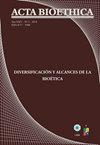牙科研究生对生物伦理原则的认识和应用
IF 0.3
4区 哲学
Q4 ETHICS
引用次数: 2
摘要
摘要:自2008年以来,生物伦理学已正式加入厄瓜多尔牙科职业课程。此外,还制定了规范牙医在临床活动中可能出现的各种困境的道德行为的文件。本研究旨在描述生物伦理原则在口腔健康专业人员中的知识水平和应用。本研究采用定量、描述性和横断面研究方法,通过结构化调查,应用于牙科领域的研究生。本研究采用描述性和相关性的方法对数据进行处理和分析。本研究的目的是评估生物伦理原则的知识水平。在这些群体中,生物伦理原则知识比例最高的是无伤害原则在临床实践中的应用。对理论的无知被揭示:许多人不知道口腔健康专业人员正确行动的基本生物伦理原则。然而,在执行这些原则方面已显示出越来越多的变化。关键词:生命伦理学,牙科,生命伦理学原则,知识,摘要:自2008年以来,生物伦理学已正式加入厄瓜多尔的牙科课程。此外,还制定了规范牙医在临床活动中可能出现的各种困境中的道德行为的文件。This research叙述seeks to the level of knowledge and application of口头bioethical原则in health professionals。采用定量、描述性和横断面研究方法,采用结构化调查的方法,对牙科领域的研究生进行研究。该数据以描述性和相关性的方式处理和分析。所取得的成果突出表明存在生物伦理原则的五个层次的知识。在这些群体中,生物伦理原则知识比例最高的群体强调了无害原则在其临床实践中的应用。缺乏关于这一理论的知识:许多人不了解口腔保健专业人员正确行动的基本生物伦理原则。然而,在应用这些原则方面,已经出现了日益增长的变化。本文章由计算机程序翻译,如有差异,请以英文原文为准。
Conocimiento y aplicación de los principios bioéticos en alumnos de posgrado de Odontología
Resumen : La bioética ha sido agregada formalmente, desde 2008, a la malla curricular de la carrera de Odontología en el Ecuador. También se han creado documentos que rigen el accionar ético del odontólogo frente a distintos dilemas que se pueden presentar durante su actividad clínica. Esta investigación busca describir el nivel del conocimiento y la aplicación de los principios bioéticos en los profesionales de salud oral. Se utilizó un método de investigación cuantitativo, descriptivo y transversal, mediante una encuesta estructurada, aplicada a estudiantes de posgrado en el área odontológica. Los datos fueron procesados y analizados de forma descriptiva y correlacional. Los resultados obtenidos, resaltaron la presencia de cinco niveles de conocimiento sobre principios bioéticos. Entre estos, en los grupos de mayor porcentaje de conocimiento sobre los principios bioéticos se destacó la aplicación del principio de no maleficencia en su práctica clínica. Se reveló desconocimiento sobre la teoría: muchos desconocen los principios bioéticos básicos del correcto accionar del profesional de salud oral. Sin embargo, se ha demostrado un creciente cambio con respecto a la aplicación de estos principios. Palabras clave: bioética, odontología, principios bioéticos, conocimiento, Abstract : Bioethics has been formally added, since 2008, to the curricula of dentistry courses in Ecuador. Documents have also been created that govern the ethical actions of the dentist in the face of different dilemmas that may arise during their clinical activity. This research seeks to describe the level of knowledge and application of bioethical principles in oral health professionals. A quantitative, descriptive and cross-sectional research method was used, by means of a structured survey, applied to postgraduate students in the dental area. The data were processed and analyzed in a descriptive and correlational manner. The results obtained highlighted the presence of five levels of knowledge of bioethical principles. Among these, in the groups with the highest percentage of knowledge about bioethical principles, the application of the principle of non-maleficence in their clinical practice was highlighted. Lack of knowledge about the theory was revealed: many are unaware of the basic bioethical principles of the correct action of the oral health professional. However, a growing change has been demonstrated with regard to the application of these principles.
求助全文
通过发布文献求助,成功后即可免费获取论文全文。
去求助
来源期刊

Acta Bioethica
Bioethical Issues-
CiteScore
0.40
自引率
0.00%
发文量
22
审稿时长
12 weeks
期刊介绍:
Acta Bioethica is a biannual publication by the Interdisciplinary Center for Studies in Bioethics of the University of Chile (ISSN 0717-5906, press edition, y 1726-569-X, electronic edition), which publishes in three languages: Spanish, English and Portuguese.
Indexed in Science Citation Index (SCI), Scopus, Lilacs, SciELO y Latindex, and in database from several Institutions; it constitutes a pluralistic source of perspectives and an important tribune which accepts the contributions of authors compromised with the interdisciplinary study of ethical determinants and consequences of techno scientific research.
 求助内容:
求助内容: 应助结果提醒方式:
应助结果提醒方式:


